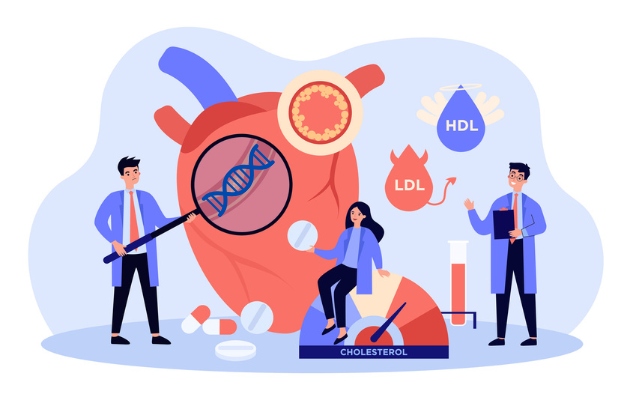
Picture this: a sunny afternoon in Kanpur, Uttar Pradesh, where a group of young boys eagerly gather on a dusty cricket field. Laughter and banter fill the air as they gear up for an exciting game. Among them is 16-year-old Anuj Pandey, a budding cricketer with dreams of making it big in the sport. As Anuj energetically chased a run, his world turned upside down. He suddenly felt a wave of dizziness sweep over him, and before he could comprehend what was happening, he collapsed onto the ground, unconscious.
He was rushed to the nearest hospital, but it was too late. The doctors could only declare him brought dead due to heart attack. Anuj's sudden and unexpected death sent shockwaves through his community and beyond, shining a spotlight on a disturbing trend - heart disorders are not just a concern for the elderly, but also a growing threat to the younger generation, particularly in India.
Heart attacks don't discriminate - they can affect anyone, including those who may seem to be at the peak of their health. Even celebrities, who are often seen as paragons of fitness and vitality, are not immune to the silent threat of heart disease. Imagine the disbelief when fitness icon Sushmita Sen (47), celebrated for her vibrant lifestyle, revealed that she had experienced a staggering 95 percent blockage in one of her arteries at a relatively young age. And she's not alone. The tragic loss of actor Puneet Rajkumar (46) and actor Siddharth Shukla (40), all due to heart-related issues, serves as yet another poignant reminder that cardiovascular disorders (CVDs) knows no boundaries when it comes to age or fitness level. It's a stark reality that anyone can fall victim to this silent killer.
These eye-opening examples serve as a wake-up call to prioritize heart health and take proactive measures to PREDICT and PREVENT risks early on. The question arises: what more can be done to prevent such devastating losses and protect the heart health of young Indians?
In this blog, we delve into the reality of heart attacks among young Indians and explore a potential solution that goes beyond traditional diet and lifestyle interventions - the role of genetic testing in preventing such devastating events.
The Shocking Reality: Heart Attacks Strike the Younger Generation in India
Statistics paint a worrisome picture, revealing that heart attacks are becoming more prevalent among young Indians. Shockingly, Indians develop heart disease up to a decade earlier than the global average population. In fact, studies like the INTERHEART study, conducted across 52 countries, have found that people of South Asian descent, including India, Pakistan, Nepal, and Sri Lanka, are at four times higher risk of heart disease compared to the general population. This concerning trend has been reconfirmed by multiple studies.
In India, the numbers are alarming. Guess how many lives heart disorders snatches away in India alone? It’s over three million lives yearly and these numbers are only getting worse. In 2019 alone, there was a staggering 69.2% increase in deaths attributable to CVDs in comparison to 2009. These numbers are projected to increase 2.3 folds by 2040, according to predictions by scientists.
Are you wondering why even people with healthy lifestyles can still be at risk for heart disease? Well, here's the hidden culprit: your DNA. Despite maintaining good habits, some individuals may have a genetic predisposition to CVDs, which increases their risk of developing heart disease at a younger age.
Don't let genetics catch you off guard when it comes to your heart health. . Let’s understand beyond the traditional risk factors, and empower young Indians to take control of their heart health. Let's delve into the fascinating world of genetics
Building Blocks of Life: Genes and Genetic Variants Explained
Wait a minute! Before we dig into how genes and genetic variants can impact heart disease risk, let me break it down for you in simple terms. Think of genes as tiny blueprints that make up our DNA, the building blocks of life.
Genes are like instruction manuals that tell our bodies how to work. They carry the information that determines our physical traits, such as our eye colour, height, or skin tone. These differences in physical appearance are due to tiny variations in our genes, known as genomic variants. These genomic variants make each of us unique.
For example, the variation in genes responsible for producing pigments in our eyes can result in different eye colours, such as blue, brown, or green. So, our genes not only provide instructions for our physical appearance, but they also play a role in how our bodies function. Similarly, when it comes to heart disease risk, some genetic variants can increase your risk, even if you are leading a healthy lifestyle. Discover how these genetic variants (also called mutations) may impact your cardiovascular health and take proactive steps to protect your heart!
Unlocking the Mystery: Exploring Genetic Risk Factors for Heart Disorders
Our genes play a crucial role in determining our risk for developing heart disease, including heart attacks. Research indicates that Indians tend to have a higher genetic susceptibility to develop coronary artery disease (CAD), where plaque builds up in the arteries and can lead to a heart attack.
When we talk about genetic risk factors for heart disease, we often divide them into two categories: monogenic and polygenic. Monogenic means that there is a specific genetic mutation that runs in families. Monogenic cardiovascular diseases (MCVDs) are less common but increases the risk of developing certain heart conditions such as familial hypercholesterolemia, a condition that causes high cholesterol levels in the blood, or hypertrophic cardiomyopathy, a condition that affects the structure and function of the heart.
Polygenic risk refers to the combined effect of multiple gene variants that collectively contribute to an increased risk of a disease, rather than a single gene being solely responsible. CAD, the leading cause of heart attacks, is often influenced by polygenic risk, which means that a combination of variants result in an increased risk. Now, the question arises: How can we detect these genetic variants and take appropriate steps to prevent, manage or reduce the risk of heart attacks? Genetic testing provides the solution.
Know your Heart: Genetic Testing as a Shield for Young Indians
Genetic testing has emerged as a powerful tool that only needs to be done once in your life. This one-time test allows you to uncover genetic variants that have been associated with heart attacks. By analysing these variants, a polygenic risk score test can provide valuable insights into an individual's genetic predisposition to CAD, helping to identify those at higher risk.
A widely recognized genetic risk factor for heart disease is a genetic variation in the APOE gene, which produces apolipoprotein E (APOE). Inheriting one or two copies of the APOE4 variant increases the risk of high cholesterol levels, leading to artery blockages and a higher risk of heart disease. Genetic testing can identify many such variants that increase the risk of CVDs.
Imagine you could ask someone who is on their deathbed if they would trade their entire fortune for just one more day of life. The value of health and well-being becomes crystal clear in that moment. With genetic testing, you have the power to glimpse into the future, identifying your genetic predisposition to heart disease and taking proactive steps to mitigate the risk. It's like having a crystal ball that reveals your health destiny ahead of time.
It's a game-changer, giving you the opportunity to take control of your health and prevent heart attacks before they happen. The satisfaction and peace of mind that comes from knowing you're taking charge of your heart health is simply incomparable to any fortune or material possession. It's a priceless gift that genetic testing can offer, giving you the power to shape your own future for the better.
Genetic Testing: What You Need to Know
With DNA testing becoming more accessible than ever, you now have the incredible opportunity to start a fascinating journey of self-discovery. It's important to understand the different types of genetic testing and how they work. But hey, with so many options out there, it's like navigating a DNA maze. Don't worry, we've got you covered! Let's take a closer look at the two major types of 'Direct-to-consumer' genetic testing: genotyping and sequencing.
Genotyping
Genotyping, a type of genetic testing, that takes a snapshot of your genetic makeup. Genotyping arrays, widely utilized in human genetic testing, meticulously scan 500,000 to 1 million (10 lakhs) distinct genetic variants in your DNA. Skilled scientists then analyse these variants to unlock valuable insights into your genetic predisposition for certain diseases and conditions, enabling personalized risk assessment and tailored preventive measures. They provide insights into your ancestry, as well as traits such as hair type, taste preferences, athletic performance, skin pigmentation, and lactose intolerance, among others. Additionally, it can reveal information about various health conditions like heart disorders.
When you compare genotyping genetic testing to standard biochemical testing, like a complete blood count, which typically analyses 800-100 markers for overall health, the sheer magnitude of information obtained from analysing 1 million (10 lakhs) markers is staggering. It's like unlocking a wealth of health information, providing unparalleled depth and breadth of genetic insights.
Sequencing
On the other hand, sequencing is like reading your entire genetic story, cover to cover. It provides a comprehensive view of your DNA, unlocking a treasure trove of information about your genes, their variations, and their potential impacts on your health. It's like having the entire book of your genetic code in your hands, revealing the full story of you. These three sequencing methods are commonly used for diagnostic testing, and are also becoming increasingly popular in direct-to-consumer genetic testing.
- Targeted Sequencing: Focuses on specific disease-associated regions of DNA that are known to be associated with certain diseases or conditions.
- Whole Exome Sequencing: Analyses all protein-coding regions of genes for comprehensive yet more affordable genetic testing.
- Whole Genome Sequencing: Provides most comprehensive type of sequencing, as it involves analysing the entire DNA sequence of an individual. It can be more expensive compared to targeted sequencing or whole exome sequencing.
Are you ready to peek into your DNA and unravel the mysteries of your life. Take charge of your heart health today and pave the way to a healthier future with our comprehensive and personalized cutting-edge genetic testing solutions.
Need help with heart disorders? Which genetic testing is right for you? Gena HealthX can help you decide. Contact us at contact@genahealthx.com
Maximizing Genetic Insights: Pharmacogenomics, Nutrigenomics, and Lifestyle Modifications
Now that you have unlocked the wealth of information through genetic testing, the possibilities are endless. It's not just about disease risk prediction, but also about harnessing the power of genetics to optimize your health in every way possible. Our cutting-edge genetic testing goes beyond the basics, providing you with personalized insights into pharmacogenomics, nutrigenomics, and lifestyle modifications. Discover how your body processes medications and receive tailored treatment plans. Learn about the ideal diet and lifestyle choices based on your unique genetic makeup.
Pharmacogenomic: Discover how your genetic variations that affects how your body metabolizes certain medications. Some variants may impact your response to medications used in CVD treatment, such as antiplatelet (aspirin, clopidogrel), anticoagulants (warfarin) or statins. We can guide medication selection and dosing for optimal treatment outcomes. This information can help your healthcare provider personalize your medication regimen, ensuring that you receive the most effective and safe treatment for your condition.
Nutrigenomics: Access how your genetic variants may impact your response to diet that can influence your CVD risk, such as salt intake or fat metabolism. Find if you are intolerant to lactose, gluten, and many more. If you have a genetic variant that affects their metabolism of certain nutrients, such as vitamin D or folate, then you can adjust in your diet and supplementation accordingly. Get personalized information on many things as follows:
- How to enhance your diet with nutrigenomics for stronger bones,
- How to optimize your carb intake.
- Do you have emotional eating dependence?
- What is your ability to maintain weight loss? Many more…

Lifestyle modifications: Genetic testing can reveal how our bodies respond to stress, sleep patterns, and exercise, providing valuable information for optimizing our lifestyle choices. For example, if a CVD patient has genetic variants such as KCNH2, SCN5A, or MYBPC3 that are associated with increased risk of arrhythmias, they may need to avoid high-intensity exercises that place excessive strain on the cardiovascular system, such as heavy weightlifting or high-intensity interval training (HIIT).
Conclusion
In conclusion, genetic testing plays a crucial role in preventing heart attacks in young Indians by providing personalized risk assessment and guiding preventive measures beyond traditional diet and lifestyle modifications.
Leverage the power of Gena HealthX’s complete well-being solution for genetic diagnosis, prevention and management of heart disorders. Our precision plans offer guidance for proactive nutritional changes, personalized lifestyle modifications, and targeted medication and supplementations based on YOUR unique genetic makeup. This approach can lead to improved health outcomes, enhanced well-being, and a reduced risk of heart disorders.
Say goodbye to guesswork and embrace the power of Gena HealthX's genetics and to proactively prevent heart attacks and optimize your well-being. Let's embark on this journey of personalized health together!




